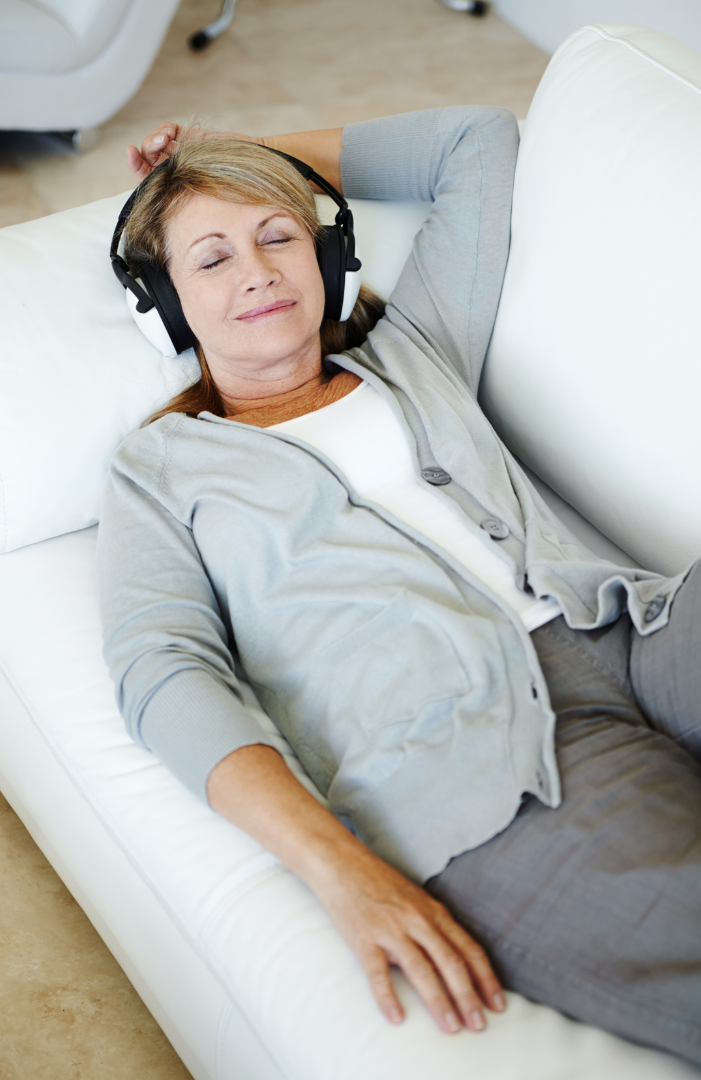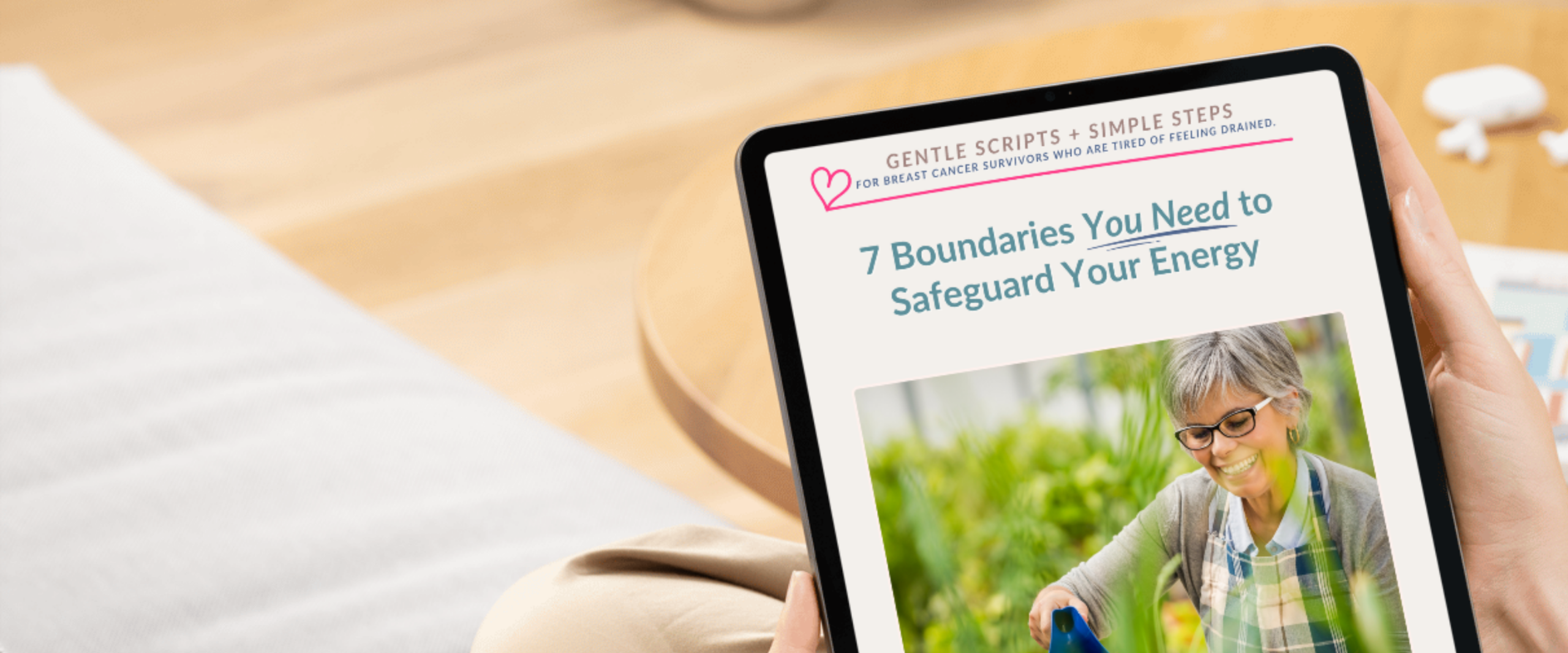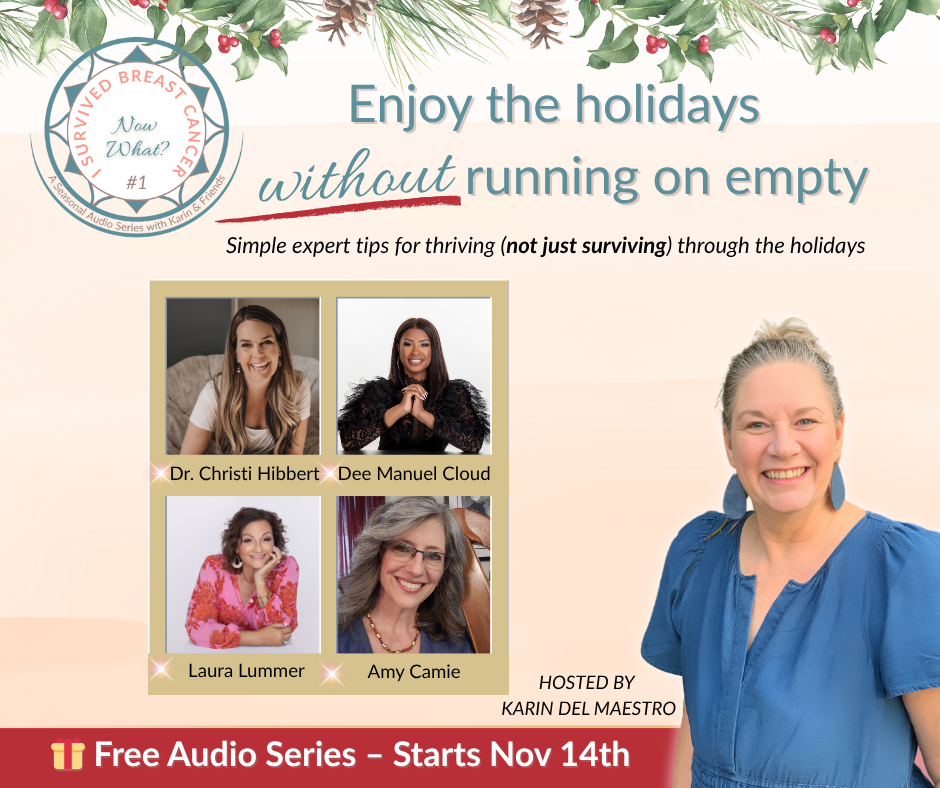12 Simple Ways to Help Lower Your Risk of Breast Cancer
Jul 24, 2020
With a disease like Breast Cancer, I think so often we don't consider the fact that we might have some control over whether or not we are impacted by it or not.
BUT, what if I were to tell you that there are environmental causes of cancer that are responsible for 90% of breast cancer diagnosis?
DO I HAVE YOUR ATTENTION NOW?
Breast cancer is very much an ENVIRONMENTAL DISEASE , which means that there is potential to have a massive impact on lowering your risk factors.
Whether you are a survivor, BRCA carrier, or someone who has been impacted by a friend or family member with breast cancer, these helpful tips apply to each of us.
Knowing that 1 in 8 women will be diagnosed with breast cancer in their lifetime, I want you to know that you CAN help yourself to lower the risk of that being you!
Now, you might be saying, but Karin you got breast cancer! Yes, I did...and although there were things that I was doing prior to diagnosis, like eating organic clean food, using clean personal care products and moving my body.
There were other things that I had not yet done...I had not yet stopped using plastic, I had not yet switched out my cleaning and laundry products.
BUT, I also didn't know that I carried the BRCA2 genetic mutation, and that meant that my risk of getting breast cancer was actually 87%.
That being said, I'd like you to consider this as an overview of some of the many things you can do to lower your breast cancer risk, (as well as be healthier in general)...let's dive in!
#1. Do a monthly self-exam.
In order to recognize when something is wrong, you need to know how your body feels "normally". Everyone is different, and that's why it's so important to get familiar with how your boobs look and feel at different times of the month (Guys, this is for you too!).
Research shows that 40% of diagnosed breast cancers are recognized by woman doing their monthly self-exam.
Not quite sure how to do your self-exam?
No worries, I've got you covered...starting September 1, 2020, (#FeelThemOnTheFirst) as a Know Your Lemons Educator, I will be hosting an online monthly breast health party to show you exactly how...
CLICK HERE TO JOIN THE NEXT BREAST HEALTH PARTY.

#2. Eat the right foods.
What you eat plays a huge role in keeping your body healthy. by eating the right foods and maintaining a healthy weight, you can dramatically reduce your risk of breast cancer.
Women who eat a fiber-rich diet are 54 percent less likely to get breast cancer. Other foods to add to the menu are mushrooms, turmeric, cruciferous vegetables, garlic, blueberries and chia seeds...to name just a few.
Minimizing processed foods and therefore the harmful toxic chemicals that they include, can also reduce you risk.

#3. Move your body.
Studies have shown that moving your body for just 30 minutes 3-5 times a week can lower your risk by 30-50%.
Exercise boosts your T-cells, which strengthen your immune system and help you fight cancer cells.
Cancer patients who move their bodies (listen to your body and start slowly...now is not the time to push) may experience less fatigue.
I like to think of our immune system as the super hero inside each of us that battles the "bad guys" every day to keep us strong and healthy.

#4. Watch the alcohol intake.
I know, I know, I hear you yelling at me already..."Karin, you're such a kill joy!"
Here's the deal, studies show that for women having more than one alcoholic drink per day has an increased risk of breast cancer. I know that it can be so easy, to start with just a glass "to take the edge off" and that can lead to the next and the next and before you know it, you're pouring the last drop from the bottle.
Trust me, I've been there!
Now, as someone who used to love a glass of wine...I chose to stop drinking after my breast cancer diagnosis, because honestly, it's just not worth it to me and I really do try to uphold me promise to myself of doing everything I can to not get this terrible disease again!
No judgement here, ever! I'm just presenting the facts, so that you can make the decision that's best for you xo.

#5. Check your labels.
Remember that environmental factors contribute to 90% of breast cancer diagnosis. These environmental factors include things like our personal care products, as well as products we use in our homes - see #6.
What you may not know yet, is that the personal care industry is hardly regulated, which means that many of the ingredients in these products are not safe.
The average woman uses 12 products every morning - that equates to approx. 168 chemicals that you put on your skin each morning...and over 80% of those chemicals have NEVER been tested for safety.
Guys...this is important to you too, although you may use less products, you're still exposed to approx. 85 chemicals.
Many chemicals used in personal care, such as parabens, phthalates, formaldehyde, triclosan, and fragrance have been directly linked to many cancers.
My choice for safer personal care products is BEAUTYCOUNTER.

#6. Check what you're cleaning with.
Most states do not require companies to disclose the ingredients in cleaning products. Even cleaning products advertised as 'green' or 'natural' may contain ingredients that can cause health problems.
It's scary to think that manufacturers can use anything they want including, known carcinogens and other harmful toxic chemicals.
A fantastic resource for checking your products is www.EWG.org.
However, I truly understand that this can be extremely overwhelming, and trust me I have studied under an environmental toxins expert, so that you don't need to feel burdened with all of the information you could find on Google. trust me, I can simplify the process for you.

#7. Managing Your Stress.
Hey, let's be honest, life is stressful and with COVID-19 adding to most peoples anxiety and stress levels, this is especially important to know.
Chronic stress, that lasts a long time purely feeds breast cancer cells. Myself, and many of my breast cancer clients experienced massive amounts of stress within the year prior to diagnosis.
For me, a year prior...within the space of 1 month, my mum passed away with me by her side, my brother almost died the day after her funeral (he has since passed also) and my husband was in a motorcycle accident, and we didn't know for 7 weeks if they were going to be able to save his right arm.
Long term stress can increase your cortisol (stress hormone) production, keeping your body in a constant state of inflammation and compromise your immune system, opening the door for those breast cancer cells to grow.
As you probably also realize, stress can prompt some unhealthy coping habits...sugar cravings galore, pouring extra wine, binging on those comfort foods.

#8. Keep your phone out of your bra.
What we know is that cellphone radiation standards have not kept up to date with cellphone culture, which is constantly changing.
One of the biggest tips for limiting your exposure to cell-phone radiation is to keep your phone at a distance. That means... stop storing your phone in your bra!
Limit your cellphone use if possible, and use a head set when practical.

#9. Get your Vitamin D.
Get outside when you can. Not only will this make you feel good physically, but the sunshine is the best natural way to get your Vitamin D. That doesn't mean that you don't need your non-toxic sunscreen - you do! But just 15 mins without it, has been shown to be highly effective for boosting your Vitamin D levels.
It's also a great opportunity to do a little digital detox AND get some exercise too...win, win!

#10. Just say no to plastic!
Bisphenol A (or as you see in Prop 65 Warnings: BPA) and Phthalates are toxins found in many plastics, including food containers, packaging, and linings. Both are found to have links to breast cancer and a wealth of other health problems. BPA is what is known as an endocrine disruptor, meaning it mimics and interferes with your body’s natural hormone function.
One of the biggest and easiest changes you can make is to stop buying plastic water bottles and switch to either glass or stainless steel refillable containers. I love these ones from AMAZON.

#11. Find the right birth control method.
This can be a tricky one, but my best advice is to speak with your doctor and let them know that reducing your risk of breast cancer is a priority to you and discuss the options together.
Some forms of hormonal birth control have been shown to increase your risk and some decrease it.
These are personal decisions, just asking the right questions and having a conversation with your doctor, will allow you to make the best decision for you and your health. Which leads us nicely to...

(Me with my kiddos, the morning of my double mastectomy, they surprised me with these shirts and the tears shortly followed!)
#12. Be your own health advocate!
Knowing your body is the key to prevention and early detection. Listen closely to your body, it tells us when something isn't right...how many times have you felt "off" or just "under the weather" but been unable to pinpoint what's going on?
It's cues can be subtle at first, but when ignored they can often get much more obvious!
Before my diagnosis, I knew that something was not right...I didn't feel well and went to see numerous doctors, underwent many tests, looked for autoimmune diseases and infectious diseases.
Then suddenly, one day about 7 months prior to my diagnosis, I fell. My legs just gave out and from that day on, for 7 months, I had excruciating back and nerve pain on my left side that kept me bedridden most days.
After more medications, physical therapy, 2 spinal cortisone shots...I was still in excruciating daily pain.
It was during my routine mammogram, that my breast cancer was discovered and shortly thereafter, my BRCA2 diagnosis. I'll go into that journey in a different post, but I want to fast forward until the day after my double mastectomy.
The day when not only did I lose all of my breast tissue, but the day that the back pain disappeared!!
What I came to learn, after researching and speaking with one of my amazing physical therapists...is that my body's central nervous system was alerting me that something was wrong.
Please do not panic if you have back pain...this does not mean that you have cancer at all, but don't put off those doctor visits just in case something else is going on.
When the cancer was removed...the alarm bell didn't need to ring anymore.
Our body communicates to us, often we don't know how to interpret what it's saying...but the key...keep searching, keep looking and if you need help, because it can feel really lonely trying to figure all of this out on your own...find someone who can be in your corner, someone like me, a health coach, who can help guide you to the right doctors and help put the puzzle together.
Don't be afraid to ask questions, don't be afraid of feeling silly and don't be afraid of getting a second opinion, if the first one isn't sitting well with you.
This is your body, your life and you deserve to feel amazing! You are the one who knows your body best and you can absolutely advocate for what you want and need.
In conclusion...
I know that this list may seem scary, or you may be wondering where do I start?
There's one thing that I want you to be clear on...this is not about making all of these changes at once, or doing each of them perfectly.
Making changes is all about progress not perfection.
Simply look at one thing per month. Get comfortable with that one thing before you move onto the next. This also happens to be the philosophy that we follow in my monthly membership - Moving Forward.
There's no pass or fail, nobody judging you...just remember why you're choosing to make these changes in the first place. Just like me giving up my glass of wine...it's not always easy, but I'm so clear on why...that's what makes it easier!
I don't know about you, whether it's age or my post breast cancer brain, but I have a hard time remembering all of this great information without my cheat sheet in front of me.
That's why I put together THE ULTIMATE BREAST HEALTH BUNDLE...

SIMPLY CLICK HERE TO GRAB YOUR BREAST HEALTH BUNDLE TODAY.



